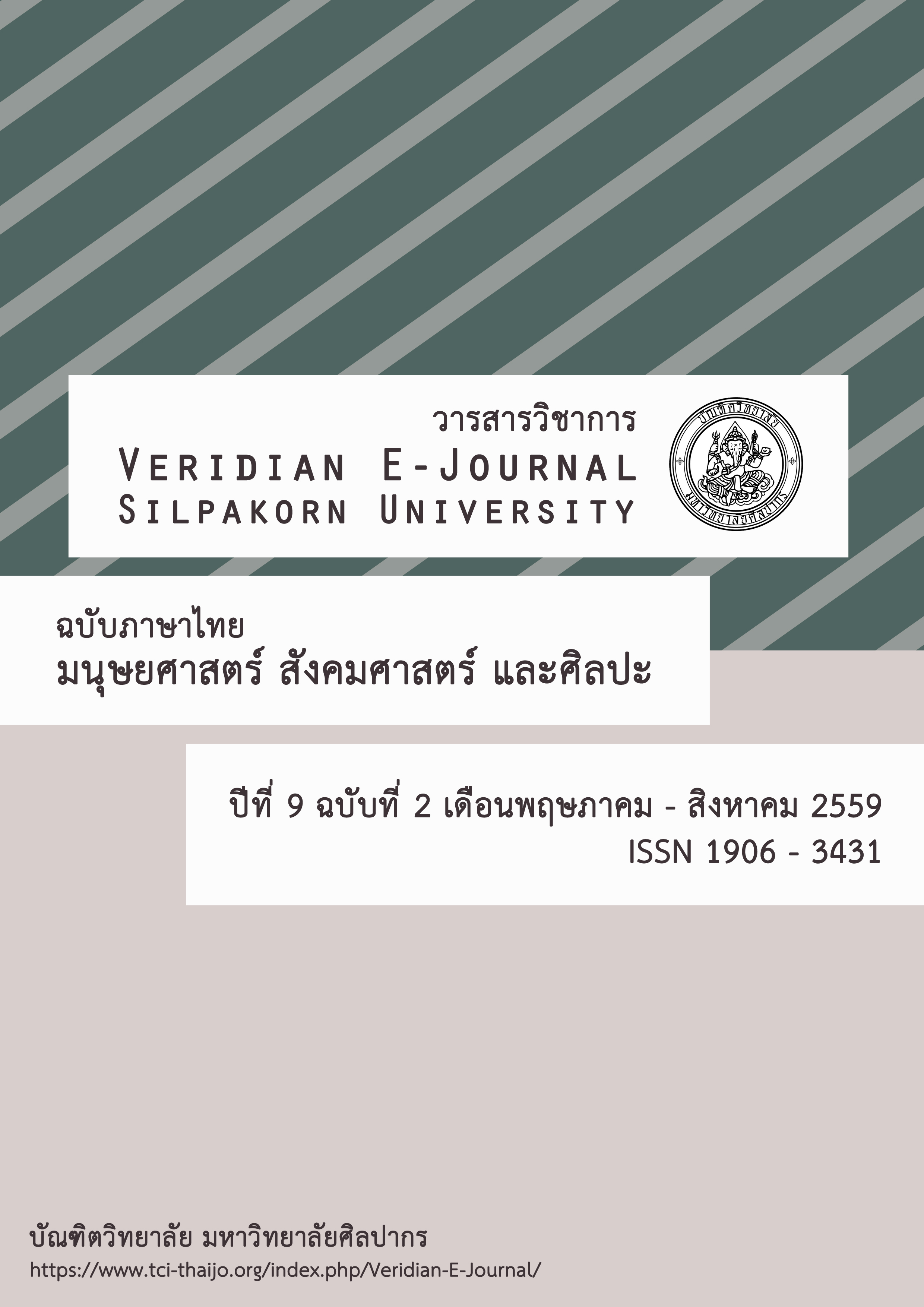การพัฒนาศักยภาพของชาวประมงพื้นบ้าน ในเขตเทศบาลตำบลพุมเรียง อำเภอไชยา จังหวัดสุราษฎร์ธานี
Main Article Content
Abstract
การวิจัยครั้งนี้ มีวัตถุประสงค์เพื่อศึกษาข้อมูลฐานและปัญหาการประกอบอาชีพของชาวประมงพื้นบ้านในเขตเทศบาลตำบลพุมเรียง อำเภอไชยา จังหวัดสุราษฎร์ธานี และเพื่อสร้างยุทธศาสตร์การพัฒนาศักยภาพของชาวประมงพื้นบ้าน กลุ่มตัวอย่างได้แก่ผู้ประกอบอาชีพประมงพื้นบ้าน ที่เป็นหัวหน้าครัวเรือนหรือบุคคลตัวแทนที่สามารถให้ข้อมูลสำคัญได้ จำนวน 40 คน โดยเลือกกลุ่มตัวอย่างแบบเจาะจง เครื่องมือการวิจัยเป็นการวิเคราะห์เอกสาร สัมภาษณ์เชิงลึก สนทนากลุ่ม การวิเคราะห์ปัจจัยภายในและภายนอกโดยใช้ เทคนิค SWOT Analysis และการจัดเวทีรับฟังความคิดเห็น วิเคราะห์ข้อมูลโดยการวิเคราะห์เนื้อหา
ผลการวิจัยพบว่า ข้อมูลฐานและปัญหาการประกอบอาชีพของชาวประมงพื้นบ้าน ด้านข้อมูลฐานเทศบาลตำบลพุมเรียงเป็นชุมชนประมงชายฝั่งด้านตะวันออกของอำเภอไชยาเหนือสุดของอ่าวบ้านดอน มีการตั้งชุมชนบริเวณปากคลองพุมเรียง ประชาชนส่วนใหญ่เป็นชาวพุทธและชาวมุสลิม มีวัฒนธรรมประเพณีที่สำคัญได้แก่ เทศกาลวันฮารีรายอ ผ้าไหมพุมเรียง มวยไชยาและผัดไทยไชยา สถานการณ์ด้านทรัพยากรธรรมชาติและสิ่งแวดล้อมในพื้นที่ การเฝ้าระวังการใช้เครื่องมือที่ผิดกฎหมายและทำลายล้างในการประกอบอาชีพประมงพื้นบ้าน ปัญหาการประกอบอาชีพประมงพื้นบ้าน ได้แก่ ปัญหาปัจจัยการผลิต วิทยาการสมัยใหม่ จำนวนทรัพยากรสัตว์น้ำ การฟื้นฟูอนุรักษ์และดูแลทรัพยากรชายฝั่ง และความไม่ชัดเจนเรื่องเขตแดนในทะเล ด้านการกำหนดยุทธศาสตร์การพัฒนาศักยภาพของชาวประมงพื้นบ้าน พบว่า ยุทธศาสตร์การอนุรักษ์และฟื้นฟูทรัพยากรธรรมชาติและสิ่งแวดล้อม ได้แก่ การอนุบาลสัตว์น้ำและปลูกป่าชายเลน การสร้างความเข้มแข็งของเครือข่ายการจัดการทรัพยากรชายฝั่งโดยวิถีประมงพื้นบ้าน ยุทธศาสตร์การพัฒนาแหล่งท่องเที่ยวชุมชน ได้แก่ การสร้างเครือข่ายการเรียนรู้ในการพัฒนาการท่องเที่ยวสีเขียวของชุมชน ยุทธศาสตร์ถ่ายทอดความรู้ด้านโฉนดทางทะเล ได้แก่ การถ่ายทอดความรู้ด้านโฉนดทางทะเล ยุทธศาสตร์ส่งเสริมการวิจัยและพัฒนาการเรียนรู้เชิงพื้นที่แบบมีส่วนร่วมของชุมชน ได้แก่ การพัฒนาขีดความสามารถในการพึ่งตนเองโดยเน้นการรวมกลุ่มประมงพื้นบ้าน พัฒนาและส่งเสริมการเรียนรู้แบบมีส่วนร่วมอย่างเป็นระบบด้านการประมงพื้นบ้าน และยุทธศาสตร์พัฒนาโครงสร้างพื้นฐานในชุมชนเชื่อมโยงสู่อาเซียน ได้แก่ การพัฒนาและสำรวจพื้นที่ร่องน้ำทางเดินเรือ และพัฒนาโครงข่ายถนนและพัฒนาระบบขนส่งทางน้ำที่ได้มาตรฐานในชุมชน
The objectives of this research were to study fundamental data and problems in working of folk fishery in PhumRiang Municipality, Chaiya District, Surat Thani Province, and to create potential development strategies for folk fishery in PhumRiang Municipality, Chaiya District, SuratThani Province. The sample group consisted of 40 folk fishery, who were household leaders or representatives that could provide important information, selected by using a purposively sampling. The research instruments consisted of documentary analysis, in-depth interview, group discussion, internal and external factor analysis using SWOT Analysis, and content analysis.
The research results regarding fundamental data showed that the majority of the folk fishery were Buddhists and Muslims. There were many important cultures and traditions such as Hari Raya Aidifiltri, PhumRiang’s silk clothes, and Chaiya’s boxing and fried noodles. Regarding natural resources and environment in the area, the folk fishery helped to monitor the use of illegal and destructive fishing tools in folk fishery. The development problems which were not conducive to potential development were such as high cost of production factors, a use of new technology, a decreasing number of aquatic resources, a lack of restoration and conservation of coastal resources, and vagueness in maritime boundary. The research results regarding the potential development strategies of the folk fishery were: strategy regarding restoration of natural resources and environment such as aquaculture nursing project, mangrove planting, and strengthening of the costal resource management network using folk fishery; strategy regarding local tourist attraction development such as creation of learning network project for green tourism development of the community; strategy regarding knowledge transfer of maritime titles such as knowledge transfer of maritime titles project; strategy regarding research support and participatory spatial learning development of the community such as capacity for self-reliance development project focusing on the aggregation of folk fishery groups and systematic participatory learning development project for folk fishery; and strategy regarding of local infrastructure development connecting with ASEAN such as navigation channel development and exploration project and road network construction project and water supply development in the community.

